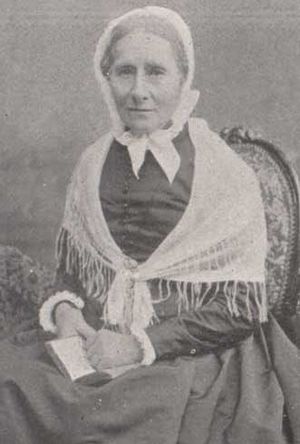Eliza Wigham facts for kids
Quick facts for kids
Eliza Wigham
|
|
|---|---|
 |
|
| Born | 23 February 1820 Edinburgh, Scotland
|
| Died | 3 November 1899 (aged 79) Dublin, Ireland
|
| Nationality | British |
| Known for | Suffragist and abolitionist |
| Board member of | Edinburgh Ladies Emancipation Society Edinburgh National Society for Women's Suffrage |
| Parent(s) | John Tertius Wigham Jane Richardson |
| Relatives | Jane Wigham (stepmother) |
Eliza Wigham (born February 23, 1820 – died November 3, 1899) was an important activist from Edinburgh, Scotland. She worked hard for many causes. These included women's suffrage (the right for women to vote) and ending slavery. She also supported peace and the temperance movement, which encouraged people to drink less alcohol.
Eliza was a key figure in improving women's rights in Britain during the 1800s. She is remembered as one of Edinburgh's most important citizens. Her stepmother, Jane Smeal, was also a leading activist. Together, they helped create the Edinburgh Ladies' Emancipation Society. Eliza's brother, John Richardson Wigham, was a famous engineer who designed lighthouses.
Contents
Early Life in Edinburgh
Eliza Wigham was born in Edinburgh on February 23, 1820. Her father, John Tertius Wigham, made cotton and shawls. Her mother was Jane Richardson. Eliza was one of six children in the family. They lived at 5 South Gray Street in Edinburgh.
The Wigham family were Quakers. Quakers were often involved in the anti-slavery movement. Many Quaker families in Edinburgh, Glasgow, Newcastle, and Dublin worked together against slavery.
When Eliza was about ten years old, her mother, older sister, and younger brother passed away. In 1840, her father married again to Jane Smeal. Jane was a strong supporter of ending slavery and giving women the right to vote.
Fighting for Important Causes
Eliza Wigham was the treasurer of the Edinburgh Ladies' Emancipation Society. This group worked to end slavery. Unlike many other anti-slavery groups, the Edinburgh society kept going until 1870. This success was largely due to Eliza and her stepmother, Jane Smeal.
Attending the Anti-Slavery Convention
In 1840, Eliza and her friend Elizabeth Pease Nichol traveled to London. They went to the World Anti-Slavery Convention, which started on June 12. Many important activists were there. These included British women like Lucy Townsend and Mary Anne Rawson. American activists like Lucretia Mott and Elizabeth Cady Stanton also attended. However, the women delegates had to sit in a separate area.
Working for Women's Right to Vote
Eliza, her stepmother, and their friends started the Edinburgh branch of the National Society of Women's Suffrage. This group worked to get women the right to vote. Eliza and her friend Agnes McLaren became the secretaries. Priscilla Bright McLaren was the president, and Elizabeth Pease was the treasurer.
Influencing Government Decisions
In 1863, Eliza was part of a committee for Clementia Taylor's Ladies' London Emancipation Society. She worked with Mary Estlin on this. That same year, Eliza wrote a short book called The Anti-Slavery Cause in America and its Martyrs. She wrote it to try and influence the British government.
At that time, people worried that Britain might support the Confederates in the American Civil War. This would mean Britain was supporting slavery. Eliza's book aimed to prevent this.
Supporting Temperance
Eliza also played an active role in the British Women's Temperance Association Scottish Christian Union. This group encouraged people to drink less alcohol. Eliza became a national vice president for the organization.
Family Life and Caregiving
Eliza's father passed away in 1864. After his death, Eliza continued to live with her stepmother, Jane, at their home in Edinburgh. Eliza took care of Jane until Jane died in November 1888, after being ill for several months.
In 1897, Eliza's brother died. After this, Eliza sold their property. She then moved to Dublin, where her relatives could care for her. Eliza Wigham died in Foxrock, near Dublin, in 1899.
Eliza Wigham's Legacy
A book remembering Eliza Wigham was published in 1901. In 2015, local historians started a project about four women from Edinburgh. These women were important in the fight for women's rights and against slavery. The project aimed to recognize Eliza Wigham, Elizabeth Pease Nichol, Priscilla Bright McLaren, and Jane Smeal. They called them the city's "forgotten heroines."
See also
 In Spanish: Eliza Wigham para niños
In Spanish: Eliza Wigham para niños
Images for kids
 | Laphonza Butler |
 | Daisy Bates |
 | Elizabeth Piper Ensley |


